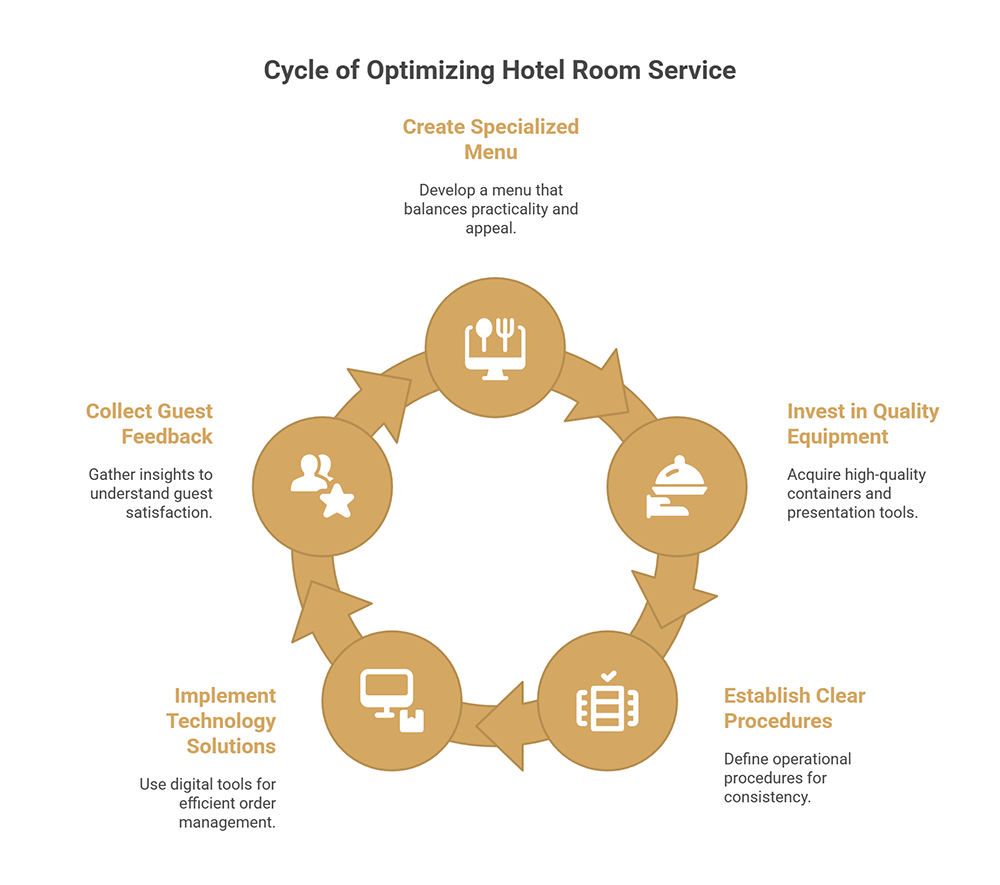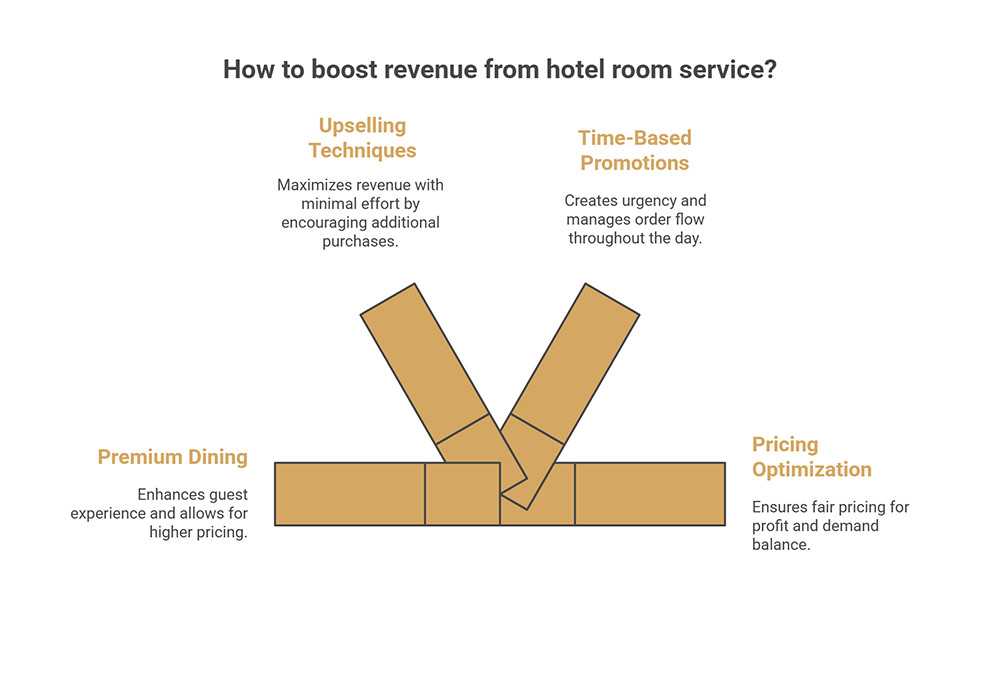Hotel room service provides guests with access to food, drinks and other items, delivered directly to their door. This offers excellent convenience and is used by all kinds of guests, including leisure and business travelers.
Room service is an important offering and can help to shape overall guest satisfaction levels. It also provides an additional revenue stream for hotels and similar properties, improving overall financial outcomes.
In this article, you will find details about what room service is, why it matters and how you can optimize your offering. You will also find tips for boosting revenue and best practices for effective implementation.
Table of Contents:
- What is Hotel Room Service?
- Why Hotel Room Service is Important
- 5 Essential Strategies to Optimize Hotel Room Service
- Create a Specialized Menu, Balancing Practicality and Appeal
- Invest in High-Quality Containers and Presentation Equipment
- Establish Clear Operational Procedures and Training Activities
- Implement Technology Solutions for Taking Orders and Tracking
- Develop a Strategy for Feedback Collection and Continuous Improvement
- 4 Revenue-Boosting Approaches for Hotel Room Service
- 4 Emerging Trends Reshaping Hotel Room Service
- Key Considerations When Implementing Hotel Room Service
- Best Practices for Excellence in Hotel Room Service
- Hotel Room Categories and Maximizing Revenue
- How to Optimize Your Hotel Breakfast Service
What is Hotel Room Service?
Hotel room service is the name given to services that allow guests to place orders for delivery to their room. Most commonly this consists of food and drinks, but it may also occasionally include other items.
Sometimes known as in-room dining, room service is generally the responsibility of the food and beverage department. The service relies on kitchen staff to prepare items and food runners to deliver the items.
Room service often features elements of personalization. Guests will generally have a room service menu in their room, which may include meals, snacks and drinks. Sometimes, convenience items, like toiletries, may be available too.
Why Hotel Room Service is Important
Room service is important in the modern hotel industry because it combines convenience, personalization and customer satisfaction. Guests are able to place an order and receive it in the privacy and comfort of their room.
Many hotel room service offerings cover times outside of the opening hours for the hotel restaurant. This makes it a valuable service for guests, who can eat at a time that suits their needs.
Room service can also be an important accessibility option for guests with mobility limitations. For hotels, room service is an extra revenue stream and a way of diversifying income, rather than relying solely on room sales.
5 Essential Strategies to Optimize Hotel Room Service
A successful hotel room service offering depends on the right level of planning. In the following sections, you can explore vital strategies for optimizing room service and exceeding hotel guest expectations.
Video: Room Service Procedure Explained | Doing Room Service Correctly
1. Create a Specialized Menu, Balancing Practicality and Appeal
Your hotel room service offering should include a dedicated room service menu, made up of items that can be moved around the hotel easily. Try to identify options that are practical, but with genuine appeal.
This is important because your room service offering needs to attract orders from hotel guests to generate revenue. At the same time, you want to make sure you are offering quality items, which travel well.
Many hotels offer a selection of relatively simple, but appealing options, including sandwiches, snacks and comfort foods. For hot foods and complete meals, focus on options that can be easily carried and effectively presented. It is also sensible to offer vegetarian and vegan options and to pay attention to guest feedback.
2. Invest in High-Quality Containers and Presentation Equipment
Room service is about selling an experience to different types of guests in different hotel room types. This is why it is a good idea to invest in high-quality containers and equipment for presenting the food.
Presentation is a key part of hotel room service and you want to make sure guests have a positive first impression of your food. Good presentation also shows that your hotel goes the extra mile and cares about the smaller details.
Examples of equipment you should invest in include stylish serving trays, containers that can keep food hot while it is being moved around, and nice cutlery. You should also ensure equipment is inspected and replaced when necessary.
3. Establish Clear Operational Procedures and Training Activities
A good hotel room service offering relies on defined operational procedures around taking orders, preparing food and delivering it. Your operational procedures should also include following up with guests and acting on feedback.
Having defined processes is important for achieving a level of consistency in your service. These procedures can also help you to hold employees accountable and maintain standards over time.
Providing high-quality training activities is important for keeping standards high and for introducing new ideas. You can also use training to correct existing issues or implement new procedures.
4. Implement Technology Solutions for Taking Orders and Tracking
Digital technology is now ubiquitous within the hotel industry and needs to factor into hotel room service too. Use mobile apps, online menus and other digital ordering systems to receive orders and track progress.
The use of digital technology is important for record-keeping and managing a large number of orders at the same time. At the same time, apps and in-room tablets can make the ordering process easier.
Compared to older methods, like telephone orders, digital technology can reduce human error. The ability to continually track and refer back to an order can help to avoid situations where hotel guests receive the wrong order, resulting in higher overall levels of guest satisfaction and reduced costs associated with waste.
5. Develop a Strategy for Feedback Collection and Continuous Improvement
You need to create a robust strategy for collecting feedback from guests, based on their experiences with room service. This can then be used to build a strategy for continuous improvement.
Receiving guest feedback is essential for understanding what you are doing right and where there is room for improvement. It allows you to fine tune your hotel room service offering over time, based on real insights.
The easiest options to implement are digital surveys, carried out through a hotel app or via email. You can also track sentiment on review platforms and social media, carry out follow-up calls, or ask people in-person. Analyze feedback over time and try to identify trends and common concerns you can address.
4 Revenue-Boosting Approaches for Hotel Room Service
Ultimately, for those in the hotel industry, room service is intended to generate revenue. Here, you can find a breakdown of some of the best revenue-boosting techniques that go beyond basic hotel room service offerings.
1. Develop Premium In-Room Dining Experiences
One of the best ways to increase revenue from hotel room service is to offer premium in-room dining. This involves creating truly memorable food experiences, which go above and beyond the typical service.
By offering premium dining experiences, you can charge more for your room service without adversely affecting hotel guest satisfaction. It also allows you to directly enhance the overall guest experience through room service.
Premium dining experiences may appeal more to people in certain hotel room types, like luxury suites or honeymoon suites. Examples may include romantic, candle-lit dinner packages or chef-led cooking experiences.
2. Implement Strategic Upselling Techniques
Upselling and cross selling involve encouraging customers to purchase more expensive items than they were planning, or adding extra items. This could mean taking steps to encourage side orders, desserts and other items.
These techniques are used to maximize revenue, while enhancing the guest experience. It can make it more worthwhile to offer hotel room service and can result in extra earnings with minimal extra effort.
Digital ordering platforms are ideal for this, as they can promote special offers or make intelligent recommendations, based on past orders. A simple alert that other guests who have ordered a dish also ordered a particular side option or drink can result in customers adding these items to their order and spending more money.
3. Create Time-Based Promotions and Packages
Using hotel room service promotions and package deals can help to increase demand. When these promotions and packages are time-based, you can also add a “fear of missing out” element to the equation.
Time-based promotions and packages help to create an extra incentive for guests to place an order. These promotions can also be used strategically to manage when orders are placed throughout the day, helping to manage workloads.
Options here are almost limitless, from breakfast and brunch offers, to special offers late in the evening, potentially allowing hotels to make use of unused ingredients and avoid waste. A happy hour period can be implemented to try to control when most room service orders come in, while premium experiences can also be made time-limited.
4. Optimize Pricing and Packaging Strategies
A top priority when it comes to optimizing revenue from hotel room service is to optimize pricing and packaging strategies. Make sure you are charging fees that deliver solid profits and use packages to drum up extra demand.
Pricing is important because under-pricing can result in a lack of revenue coming in, while over-pricing can result in a lack of demand. It is important to set fair prices, but they must deliver a profit.
You can also include incentives like family packages to encourage larger orders, allowing your business to earn more total revenue from a single room. Make sure you are regularly analyzing your pricing strategy and making adjustments.
4 Emerging Trends Reshaping Hotel Room Service
Hotel room service and in-room dining are constantly evolving. Here, you can explore some of the emerging trends that are helping to shape the future of the experience for hotel gusts.
Video: Hotel Service Robot
1. Contactless Delivery and Digital Experience Enhancement
There is a growing movement towards a contactless delivery model, where hotel guests have no real contact with staff. Instead, guests will be alerted to their food being left outside their hotel room.
In general, the rise of contactless delivery speaks to growing demands for privacy. At the same time, this approach grew in popularity around the time of the COVID-19 pandemic, helping to minimize contact for health purposes.
Digital technology is also increasingly used in other ways to enhance the experience for guests, including mobile alerts when food has been delivered and options for sharing feedback easily.
2. Sustainability Initiatives for Room Service Operations
There is an ever-greater demand for sustainability initiatives, which can take many forms within hotel room service. Examples include using locally-sourced foods, reducing waste and avoiding single-use plastics.
Sustainability is important because hotel guests are increasingly aware of the harms associated with travel. To counteract this, many now want to do business with hotels that are doing their fair share to help.
Consider offering seasonal menus to make use of seasonal ingredients and find ways to reduce the CO2 emissions associated with your meals. You can also consider techniques like carbon offsetting to ease concerns.
3. Integration with Wellness and Lifestyle Programming
Your hotel room service can be integrated with wellness and lifestyle offerings. This is a great example of how room service is starting to evolve beyond conventional expectations.
Wellness and lifestyle factors are becoming more important for hotel guests and are often the reason they choose a specific hotel. Providing relevant room service offerings helps to maintain consistency.
Examples may include vegetarian and vegan food, gluten-free menu items and alcohol-free cocktails. You could also create specialized menus, aimed to help with jet lag or complement the fitness offerings in your hotel.
4. Artificial Intelligence and Predictive Personalization
Artificial intelligence is also making its way into hotel room service, especially influencing digital ordering systems. Here, it can be used to predict behaviors, analyze customer data and make intelligent recommendations.
The role of AI is increasingly important because it can automate the analysis of feedback and sales data. From the guest perspective, AI can help to highlight food and drink options that are most likely to appeal.
Some hotels are experimenting with systems that can align food recommendations with the specific needs of guests. This could include recommending high protein meals after a workout, or high energy meals to cure jet lag.
Key Considerations When Implementing Hotel Room Service
Prior to revamping or introducing a hotel room service offering, take the following considerations into account:
- Operational Hours: Be clear on the hours of the day hotel room service will be available, balancing guest demand, staffing needs and costs. Continuously monitor these issues and make changes when necessary.
- Room Service Menu Crafting: Create a robust menu, that will retain high quality after being delivered. Make sure there are a variety of options, including items for people with special dietary requirements.
- Staffing Requirements: Consider how many staff are needed to take orders, prepare food and deliver it. Factor in costs and weigh up the pros and cons of dedicated hotel room service staff vs. sharing restaurant staff.
- Cost Structure and Pricing: Establish a pricing strategy that combines the competing needs of value for guests with profitability for your hotel. Be transparent about any additional fees charged.
- Quality Control Measures: Have procedures in place to monitor the temperature of food, the speed of delivery and the standards of presentation. Carry out checks before delivery to ensure quality.
- Technology Integration: Make effective use of digital technology to enhance ordering and feedback collection. Use the data gathered to continuously improve your hotel room service offering.
Best Practices for Excellence in Hotel Room Service
The following best practices can all help you to deliver exceptional hotel room service for your guests:
- Personalization Opportunities: Use available data on hotel guests to deliver personalized room service, providing intelligent recommendations based on past orders.
- Distinctive Presentation: Explore ways to make the presentation of food unique and memorable. Consider ways to enhance the visual impact, from food trays or plates, to cutlery and the arrangement of food itself.
- Efficient Delivery: Set realistic expectations around delivery times and establish processes to keep delivery as consistent as possible. Continuously assess performance and look for was to boost efficiency.
- Enhanced Special Occasions: Offer hotel room service packages for special occasions. This could include birthday packages, romantic meals and other small touches to enhance the experience.
- Integration of Local Foods: Selling regional dishes helps to immerse hotel guests in local culture. At the same time, it allows you to source ingredients locally, supporting your community, while reducing costs.
- Sustainability Initiatives: Implement environmentally-responsible measures, including avoiding single-use plastics, using eco-friendly packaging, reducing unnecessary waste and using local suppliers.
Hotel Room Categories and Maximizing Revenue
Hotel room service has to appeal to different types of customers, staying in different hotel room types. One of the ways hotels can design services is by categorizing rooms, based on factors like layout, occupancy, amenities or the types of beds in the rooms. Once you understand the different categories, you can learn how to maximize revenue.
In the “Hotel Room Category: Learn About Categorizing Hotel Rooms” article, you will learn about different hotel room types, how they are grouped together and why this categorization matters.
How to Optimize Your Hotel Breakfast Service
In addition to hotel room service, one of the most essential food services offered in a hotel is the breakfast service. There are a variety of common options, from an American breakfast, to a Continental or English breakfast. Some hotels also offer hotel buffets or have a breakfast room service offering.
In the “Hotel Breakfast: Types, Overview & Tips to Impress Your Guests” article, you will find a complete breakdown of the available options, along with tips for optimizing your hotel breakfast offering.
Did You Like This Article about Hotel Room Service?
You might also be interested in the following articles:
- Hotel Rooming List: Essential Guide for Efficient Guest Management
- Types of Rooms in a 5-Star Hotel: Exploring the Most Common Options
- The Differences between Hotels and Service Apartments Explained
- Types of Accommodation in the Hotel Industry
- How Long Can a Guest Stay at a Hotel? Stay Lengths Explained
Hotel room service is a crucial amenity, especially for larger hotels focused on personalization and optimizing the guest experience. By continuously refining your approach, you can deliver a service that meets and exceeds guest expectations, while providing a valuable extra revenue source for your property.










Leave A Comment